If you haven’t seen it, Gillette, the global purveyor of men’s personal care products, recently released a video ad titled “We Believe: The Best a Man Can Be.” The 1:49 minute commercial doesn’t push razors, rather it’s an image-building ad that renounces two contemptable behaviors that some men commit: sexual harassment and bullying.
The ad showcases an array of mainly scripted clips in which males, some old, some young, enact a variety of despicable acts like groping women and punching their peers. Meanwhile, a chorus of other men chants a unison refrain of rationalization, “Boys will be boys.”
The ad’s narration and text overlays provide corrective commentary:
“We believe in the best in men.”
“It’s only by challenging ourselves to do more that we can get closer to our best.”
“We are taking action at thebestmencanbe.org”
In many ways, Gillette’s messaging makes sense. The company has taken a stand against two terribly wrong and destructive behaviors and called out the men who commit them. Using a powerful quote from actor-turned-sexual-harassment-activist Terry Crews, the ad also encourages every man not to stand idly by when they see such reprehensible actions but to intervene: “Men need to hold other men accountable.”
Despite all the apparent good, the commercial has quickly become a lightning rod for controversy. Dozens of media, from Advertising Age, to Glamour, to USA Today, have run articles about the ad. As one might imagine, some commentary from the authors as well as from the general public has been positive, while other responses have been quite negative.
For instance, @pstdavid_ tweeted, “Finally got a chance to see this #GilletteAd. Quite honestly, I don’t get what all the fuss is about. In my opinion, they’re not “taking a stand on toxic masculinity” or ‘stealing your manhood.’ All they’re suggesting is that you be a decent human being. It’s not that difficult.”
Another Gillette consumer, however, tweeted a picture of his hand poised above a trash can, about to discard the Gillette razor he received on his 18th birthday and used for the past 15 years, including through basic training and four deployments. (1) The soon-to-be-former customer lamented, “since @Gillette thinks I’m a bad person, I’m throwing it away.”
Another user, @davidliedtka, took an even more extreme approach, placing his Gillette shaving creme and razor in an oven and setting the temperature to 505 degrees.
Wow. Those are strong reactions. Does Gillette or any organization that’s trying to right serious social wrongs deserve such reprisals?
The first time I saw the commercial, my reaction was generally positive: A strong brand that has built a solid reputation among millions of men was using that influence to ask them to be better. Such a plea from a huge corporate player might stand a chance of making a difference in our world. Still, there were things about the spot that didn’t seem right.
A second time through the ad, I noticed more of the agency’s specific creative decisions. For instance, while the spot’s small amount of real video footage worked, the many acted segments looked overly artificial and contrived, even though they depicted terrible events that unfortunately occur. The use of both real and scripted video seemed like a mismatch.
I hadn’t thought much more about the ad, until one of my marketing students emailed me a link to another company’s commercial that was purportedly a response to Gillette’s ad. The next day he asked if I had watched the ad. I had been very busy, so I replied I hadn’t but I was looking forward to seeing it soon.
That night I opened his email and clicked the YouTube link, which took me to an ad posted by Egard Watch Company. Viewing the 1:57 minute commercial just once, changed my perspective of Gillette’s ad.
Egard’s commercial opens with several male firefighters battling an inferno, then quickly cuts to one of them carrying a young girl safely away from the flames. Meanwhile, a narrator asks, “What is a man?” The ad continues with a wide variety of real video clips, many showing men doing very difficult or even dangerous physical labor, while the narrator poses additional questions like “Is a man brave?”, “Is a man a protector?”, and “Is a man disposable?”
The spot also shares some very sobering statistics, such as:
- Men account for 93% of workplace fatalities.
- Men comprise over 97% of war fatalities.
- 79% of all homicide victims are male.
- Men account for 80% of all suicide victims.
The commercial concludes on a positive note, asking “Is a man trying?” and offering the company’s view of masculinity: “We see the good in men.”
As marketer, I realize that the right music with moving images can tug at one’s emotions; however, Egard’s ad resonated with me, and perhaps the 324,000 people who have liked, it for another reason. Egard reminded us of the many men in our lives that we have known and loved.
The ad caused me to remember my grandfathers: one a coalminer, the other a farmer. To support their families, both did very hard, physical work that must have greatly tested both their bodies and their minds. Having experienced the ravages of WW II, my father-in-law, emigrated from Ukraine, to Brazil, to the United States, where he worked for over 30 years in a bearing factory as a tool and die maker—labor that likely explains his great loss of hearing today. My own father was not able to finish high school, yet he started his own business at age 25 and worked tirelessly with my mother to earn enough to put four children through college.
None of these men were/is perfect. Neither is their grandson/son—I’ve made plenty of mistakes; although, I don’t think I’ve done anything that someone could call bullying or sexual harassment. Most men probably can say the same. Most of the mistakes we make are not because we’re men; they’re because we’re human.
The problem with Gillette’s ad is that it stereotypes men. Not all males act like Harvey Weinstein or ‘Scott Farkus,’ the bully from A Christmas Story. In fact, the vast majority do not. Of course, Gillette’s ad doesn’t directly say that all men are sexual predators or bullies, but it does put all men in the same stereotypical boxes through some subtle visual and verbal suggestions.
One such insinuation in Gillette’s spot is the seemingly infinite lineup of men, all standing behind their BBQ grills with arms folded, chanting in unison, “Boys will be boys.” The ad’s narration also makes a stereotypical suggestion by tagging onto Crew’s “Men need to hold other men accountable” quote, adding: “ . . . accountable to act the right way; some already are, in ways big and small. But some is not enough.” I’d like to reiterate the belief that it’s most men who are acting the right way, not some.
Another Twitter user, Melissa Chen (@MsMelChen), who self-identifies as Asian, supports the suggestion that Gillette’s ad stereotypes men. She says:
“I can get behind the message that we all can be better. But the #GilletteAd ended up painting an entire demographic with a negative stereotype perpetuated by a few. Imagine the uproar if it was an ad about a racial group with higher crime rates saying, “‘you can be better.’”
Of course, on top of all this analysis is the fact that men are Gillette’s main target market.* Its iconic tagline is “The Best a Man Can Get.” Given that our family’s dog knew better than to bite the hand that fed him, it’s hard to imagine why one of the world’s biggest brands would want to risk ‘cutting the faces it shaves,’ especially when already on the ropes in a fight against Harry’s and Dollar Shave Club.
One instance of bullying or one case of sexual harassment is one too many. As such, Gillette can be commended for taking a stand against those injustices and for suggesting that others do the same. However, the company should have known much better than to unfairly throw its entire target market under the bus with broadly generalized talk of “toxic masculinity.” It’s wrong to degrade others in any way, including by negatively stereotyping, which makes Gillette guilty of “Mindless Marketing.”
*An earlier version of this article incorrectly stated that Gillette does not make products for women.
Learn more about the Mindful Matrix and Mindful Meter.
Check out Mindful Marketing Ads and Vote your Mind!

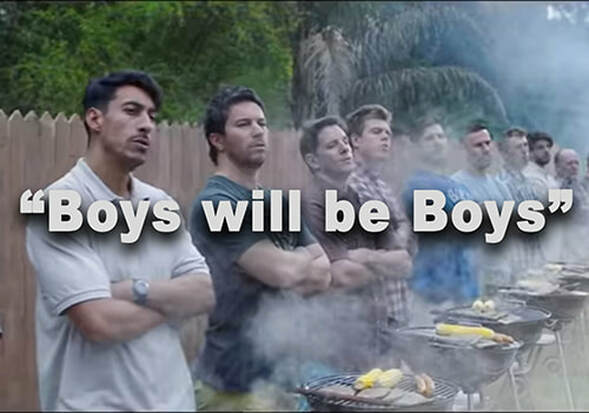
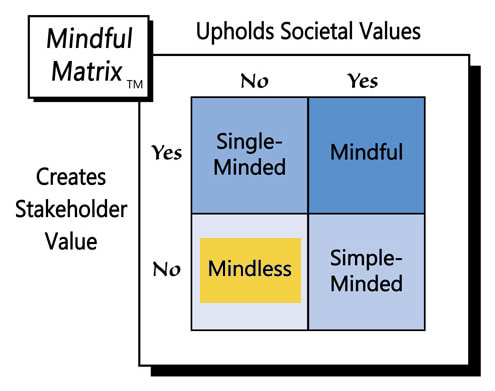
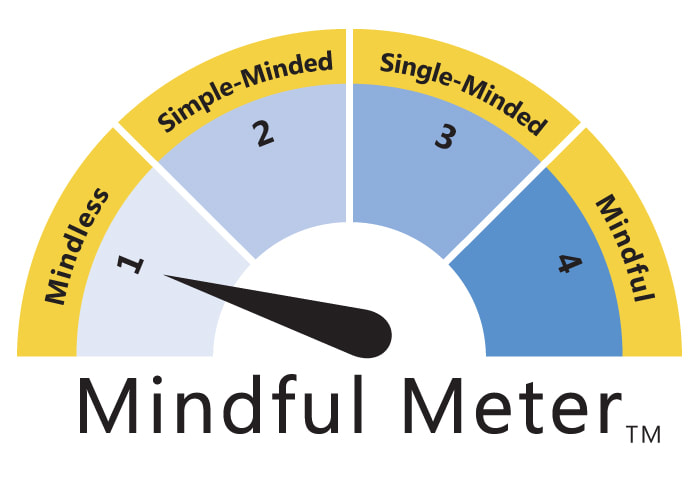

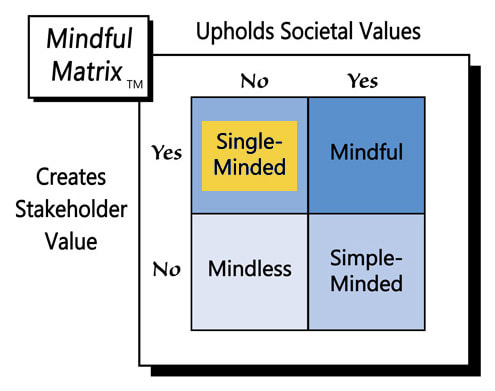
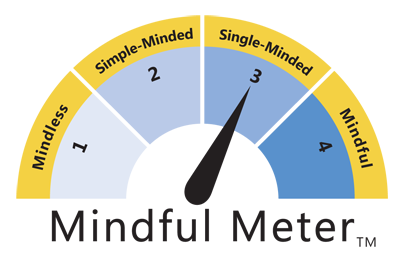
 RSS Feed
RSS Feed